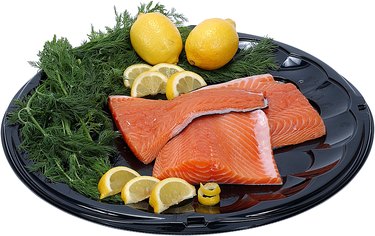
Ferritin is a protein found in red blood cells that stores iron, which transports oxygen from your lungs to all cells and tissues. The amount of ferritin in your blood is directly linked to the amount of iron in your body. Vitamin B-12 is required for metabolism and a healthy nervous system. A simple blood test can determine the levels of ferritin and B-12 in your body. Consult with your health care provider to see if you require supplements.
Causes
Video of the Day
A low dietary intake of iron can lead to ferritin deficiency. Vegetarians are likely to develop B-12 deficiency as this vitamin is limited to animal sources. Excess blood loss caused by menstruation or injury can lead to ferritin deficiency. Children, teenagers, pregnant women and breastfeeding mothers are likely to develop ferritin deficiency because of rapid body changes. Gastrointestinal disorders, such as Crohn's and celiac disease, prevent the absorption of B-12 and ferritin in the body, leading to a deficiency.
Video of the Day
Symptoms
The normal ferritin range is between 12 to 300 ng/mL for males and 12 to 150 ng/mL for females. Values less than this indicate ferritin deficiency or iron deficiency anemia. Symptoms include loss of appetite, pale skin, rapid heart rate, headache, fatigue and weight loss. Iron deficiency can cause slow cognitive and social development in children. A deficiency during pregnancy can lead to premature or small babies. MedlinePlus says blood levels of B-12 less than 200 pg/mL indicate a deficiency in this vitamin. Symptoms include depression, dizziness, weakness and poor memory. If left untreated, B-12 deficiency can lead to dementia and permanent nerve damage.
B-12 in Food
B-12 naturally occurs only in animal sources, including poultry, beef, liver and seafood. Seafood varieties include clams, trout, oysters, salmon, sardines and herring. The U.S. Department of Agriculture lists yogurt, milk and cheese as rich sources of B-12. Select nonfat or low-fat varieties. Choose cottage, Camembert, ricotta and Swiss cheeses to increase your B-12 intake. If you are a strict vegetarian, consume foods that have been fortified with B-12, such as soy products, malted drinks, breakfast cereals and nutritional yeasts.
Ferritin in Food
Consume iron-rich foods to raise your ferritin levels. Like vitamin B-12, rich sources of iron occur in beef, liver, poultry and seafood. Plant sources include pulses and beans, such as chickpeas, lentils, red kidney beans, navy beans, soybeans and lima beans. Vegetable selections include spinach, potatoes, tomatoes, turnip greens, peas, beet greens and mushrooms. Snack on nuts and dried fruits to increase your ferritin levels. Iron is also added to breakfast cereals, white grits, bread, pasta and rice. Many cereals offer up to 100 percent of the daily value of iron in one serving.